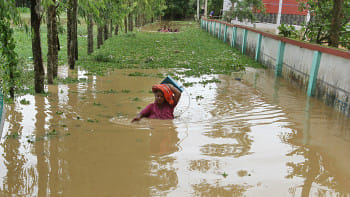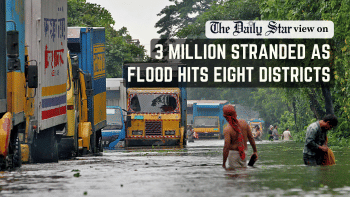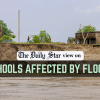Coordination vital in aid distribution

It was very heartening to see the spontaneous response from people to help those affected by the recent floods in eastern districts—one of the worst in living memory. But one lingering problem that somewhat marred this response is the insufficient logistics in relief distribution in many of the affected areas. According to a report in this daily, local administrations are struggling to reach remote areas because of logistical issues. The lack of coordination among the groups involved is causing a problem as well. We believe an urgent plan is necessary to expand and streamline all such efforts to ensure smooth delivery of relief goods.
According to the report, even though the flood situation has started to improve, there are areas where people are still trapped by water, with no modes of transport and communication available. Local administrations and volunteers are facing difficulties in reaching these areas as they don't have enough boats, particularly in Feni, Cumilla, Lakshmipur and Noakhali districts. In Feni, teams of armed forces have been trying their best to reach as many people as possible; they have air-dropped food packets in some areas. But many places remain inaccessible. Volunteer groups are working on their own; locals and some volunteers told Prothom Alo that their aid efforts in Feni Sadar are mostly limited to places close to the Dhaka-Chattogram highway. In Cumilla, more than 1.1 million people in 14 upazilas are still marooned, and they haven't received any aid yet, Samakal reported.
There is another aspect that needs attention. As the floodwater recedes, the extent of damage is coming to view. Homesteads have been severely damaged; livestock, poultry and fish farms have been washed away, affecting people's livelihoods. In many areas, people are falling sick and there is no access to first aid and basic medications. The risks of various water-borne diseases breaking out also remain a considerable cause for concern.
Given the situation, the government needs to adopt a two-pronged approach. The first is to coordinate distribution of food and medicine, especially for remote areas. The disaster management and relief ministry has already directed the DCs of flood-affected districts to coordinate with volunteers, armed forces, fire service, medical teams and others. The ministry should take the lead in this regard and guide these groups, providing necessary logistical support with the help of local government offices. The second is to plan for the post-flood scenario. People are going to need help to rebuild their lives; they will need support to make a living and survive any potential health crisis. The government must be prepared for that as well, and mobilise resources to provide the required support in the coming days.


 For all latest news, follow The Daily Star's Google News channel.
For all latest news, follow The Daily Star's Google News channel. 










Comments